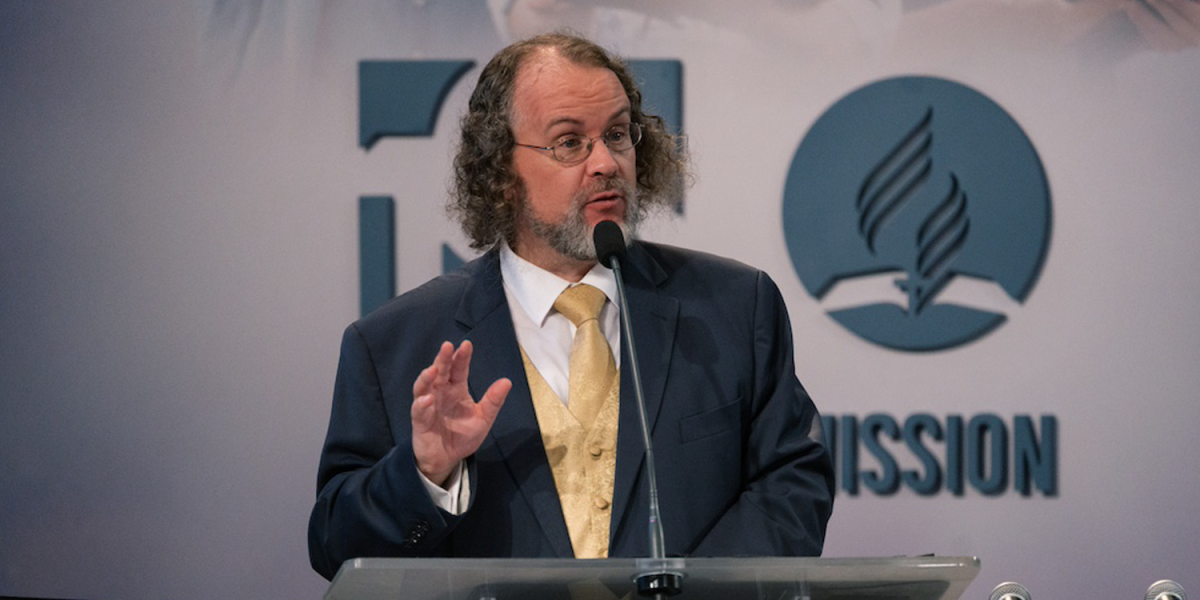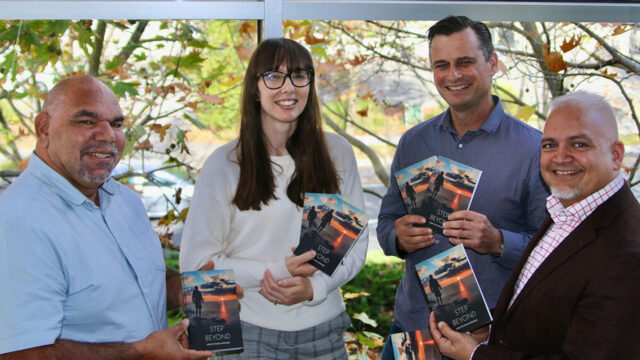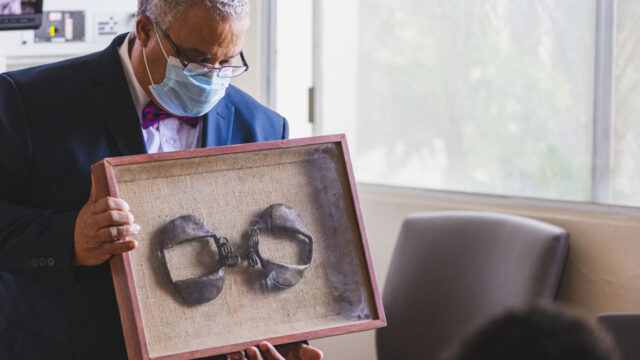Adventist leaders share plans for a year-long focus on Adventist mission.

“One hundred and sixty years ago, we were chosen for mission; 150 years ago, we started to engage in worldwide mission,” said David Trim, director of the Office of Archives, Statistics, and Research of the General Conference of Seventh-day Adventists, at the beginning of his presentation to the church’s Executive Committee (EXCOM) on October 6. Trim’s remarks focused on the year-long 2024 commemoration of the 150 years of the Adventist Church’s worldwide mission.
In his remarks at the first session of the 2023 Annual Council in Silver Spring, Maryland, United States, Trim explained that after the church was founded in 1863, church leaders hesitated for 11 years about worldwide mission. “ ‘Do we need to go beyond the United States?’ they would ask. ‘No!’ they would answer. But that eventually changed,” Trim said, “partly because in December 1871, [Adventist Church co-founder] Ellen White issued her first testimony about foreign mission.” White wrote that missionaries were needed to go to other nations. “That is still true,” Trim said.
What Early Adventist Mission Entailed
Trim reminded EXCOM members that in the 1873 General Conference Session, leaders voted to send a missionary to Europe, and in 1874, the GC sent John N. Andrews. On September 15, Andrews sailed from New York to England en route to Switzerland. “The 150th anniversary of this epochal event … offers an unparalleled opportunity to emphasize mission to church members,” Trim said.
Mission as it was understood during the first 100 years of the denomination is what might be called today “cross-cultural mission, frontier mission, or mission to unreached and under-reached people groups,” he explained. “It was difficult and dangerous work; missionaries went and immersed among the people they worked for and with, not just for years, but often for decades.”
Today, Trim conceded, the mission enterprise of the Adventist Church does not receive the level of support from its members that it did in the early and middle 1900s. “Some members even think the missionary work is largely done,” he said. “Yet, it is now clearer than ever that some parts of the world are not sufficiently strong enough to evangelize their own territories. They still need funds and organizational support; and in many cases they still need missionaries to be sent.”
Reviving and Reigniting Passion for Mission
This is the reason for Mission Refocus, an initiative that seeks to assess and prioritize use of funds and human resources according to their mission thrust. But Adventists need not only to reorient the organized church, Trim emphasized. “We also need to reignite the enthusiasm of members everywhere for worldwide mission.”
Trim added that the anniversary can help achieve the world church’s goal of “reviving the concept of worldwide mission and sacrifice for mission as a way of life involving not only pastors, but every church member, young and old,” he said, quoting the first stated objective of the I Will Go mission initiative.
A Mission History Symposium to be held October 17-19, 2024, at Andrews University will commemorate “150 years and one month after Andrews sailed,” Trim reported. Division officers and regional representatives are invited to attend the event.
Global Youth Day 2024, a service initiative of the GC Youth Department, will also focus on the anniversary. Likewise, leaders are planning four conferences for college leaders, entitled “Educated for Mission,” organized by the GC Education Department.
Trim also advertised the Mission 150 podcast, which delves into various aspects of Adventism’s early and more recent mission protagonists. It’s offered in video and audio formats, he said.

The Key Role of VividFaith
VividFaith, another initiative of the world church, which includes a platform that connects people with service opportunities all over the world, will be telling the stories of 150 mission projects launched for the 150th anniversary.
“Commemorations are always nostalgic; they give you a wonderful feeling,” VividFaith manager Fylvia Kline told EXCOM members. “But Mission 150 is more than a one-time, one-year celebration of the Adventist Church’s 150 years of mission service,” she said. “Mission 150 is a pivotal moment in our present time to challenge ourselves as a church, to challenge church members to intentionally live a life of service, where service and the sharing of our faith are more of a lifestyle than a job and an obligation.”
Kline shared that in 2024, Mission 150 aims to saturate all the communication channels in the church with at least 150 stories to inspire people.
Some VividFaith Initiatives
A short video introduced some of the projects and initiatives that will generate those mission stories.
Among them, in the Middle East and North Africa Union Mission (MENAU), a project will seek to increase the presence of Adventist missionaries in areas with no groups of worshiping Adventists. “This region may have fewer Christians than it had 2,000 years ago, than it did in Paul’s time,” MENAU executive secretary Myron Iseminger said in a video message from Damascus, Syria. MENAU “is looking for workers to carry the gospel to these parts of the world where we have no groups of worshiping Adventists,” he said.
The Chinese Union Mission (CHUM), based in Hong Kong, is looking to send more Chinese missionaries to Chinese communities around the world. CHUM executive secretary John Xiao Ming Zhang explained that regional restrictions to religious practice have made it difficult to find more trained missionaries in the region. “In 2024, we will encourage our young people to actively register as a missionary on VividFaith,” Zhang said. “We will encourage our young people to be more enthusiastic about evangelism, and also benefit the needs of Chinese people around the world.”
The West-Central Africa Division, based in Côte d’Ivoire, is seeking to provide mission opportunities for 1,000 young people. The regional focus is to empower young people to be missionaries. “For us, Mission 150 means preparing 1,000 Adventist young missionaries by providing three-month service opportunities through VividFaith,” a narrator shared in a brief video presentation. “So far, we have 110 assignments on VividFaith to jumpstart this movement, and there’s much more to come,” he added.
The goal for Mission 150 in the Ukrainian Union Conference, on the other hand, is to establish 737 Bible schools across the country. Despite the ongoing war, the Adventist Church is currently working in 30 communities with 600 teachers and about 3,000 students. “To support our in-person Bible schools, we will be recruiting through VividFaith digital missionaries who speak Ukrainian, Russian, English, and Polish,” a narrator shared in a video message. “This is a safe way for Adventists worldwide to plant in people’s hearts seeds of hope and love.”
The Southern Asia Division (SUD) will be trying to recruit 100 chaplains for schools with Hindu and Muslim children, the region’s education director Edison Samraj said. The SUD has 275 Adventist high schools in India that serve from 200 to 12,000 students each. “The majority of students in all our schools are Hindus and Muslims,” Samraj explained. “These students are our focus now for Mission 150, and it is our goal for 2024 to place at least 100 full-time high school chaplains.” Education leaders will use VividFaith to recruit them, Samraj said.
The North American Division, on the other hand, will seek to recruit volunteers to live and serve in urban communities, Mark Ferrel, pastor of the San Francisco Central Adventist Church in California, United States. “Our mission field is those people who live around us,” he acknowledged. VividFaith has helped pastors like Ferrel to find trained workers and volunteers to go and serve in San Francisco. Thanks to a generous donation, volunteers have free lodging once they accept the call to serve in the area. “We pray that God will continue to give us the volunteers and the workers and the missionaries to spread his love here in San Francisco.”
In the Trans-European Division, the region’s secretary Róbert Csizmadia shared that to celebrate and grow the legacy of mission in the region, leaders have voted to create 15 new missionary posts, especially for young adults. The focus will also be in areas with secular and Orthodox populations, he reported.
How God Has Led
For Trim, 150 years of Adventist mission might not be a reason for celebration. “ ‘Why are you still here?’ early pioneers would ask us if they could see us.” But the date deserves a commemoration, he emphasized.
“We are determined to commemorate, to mark the way God has led and prospered the work of His people when they have put their hands in His hands [and] trusted the Holy Spirit,” Trim told church leaders.
He called on leaders, as they go back to their territories, to think of ways they, too, can commemorate “150 years of God’s leading … 150 years of the Adventist Church putting the world first ahead of parochial interests,” Trim said. “Think of what you can do to reignite a passion for mission among your church members by commemorating this significant anniversary.”








